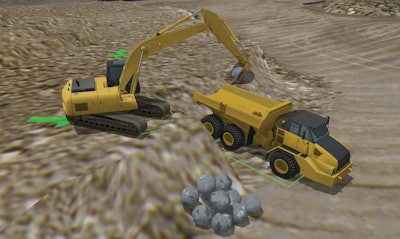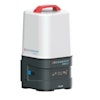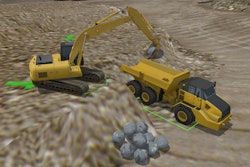
Training a novice excavator operator to perform complex tasks can be risky to both the operator and the equipment. That's where tools such as Version 2.0 of the Hydraulic Excavator Simulator from VISTA Training come in.
Housed on a high-end PC or laptop (with a separate graphics card) and outfitted with simple controls, the simulator provides an affordable way to train new operators and help experienced operators brush up on their skills. Version 2.0 now includes tasks such as trench crossing, climbing/descending benches, truck spotting from a bench and more.
"One of the nice things about it is it's a very powerful simulator without the cost and complexity of the other systems that you find out there," says Chris Cannon, training manager for VISTA.
The simulator takes a building block approach to training, starting with simple tasks and progressing to more complex ones. Software captures data that summarizes how quickly and carefully each task is performed. This data enables trainers to see areas where trainees need to improve so they can coach them to correct these weak spots.
"Within minutes, [you can] erase some bad habits that an operator has been developing or correct misperceptions that he has," says Cannon. "You would be amazed how quickly the feedback works. Once they get onto the real machine, the training is much smoother and they learn much more quickly."
Experienced operators benefit by using the simulator to fine-tune their skills. "People have the perception that the simulator looks pretty easy until they get in the seat," Cannon asserts. "The simulator can be a challenge."
Operators receive instant feedback on their performance. "It's very difficult to have somebody score you in terms of your productivity, cycle time, amount of material moved, amount of motion, timing, etc., when you're in the real world on a machine," Cannon notes. "It's down to exact numbers on a simulator, so you can actually bench test yourself. If you want to increase your productivity and cycle times, you can use the simulator to measure that very easily."
This feature can also make the simulator a valuable assessment tool for prospective operators. "Within the simulator, you can actually set benchmarks for some of the different tasks, so you can compare your performance against them," says Chuck Frey, marketing manager. "You can also use it as an assessment tool to identify candidates who have the greatest natural aptitude for equipment operation. They are the most likely to go on to be very good, productive, safe operators. That's where a simulator can really pay for itself."



















